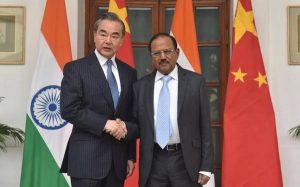
Taking a strategic view of their complex relationship, India and China agreed to finalise border-related Confidence Building Measures (CBMs) and expedite setting up of a hotline between their militaries at the 22nd round of boundary talks.
The 22nd meeting between Chinese and Indian Special Representatives on boundary issues in New Delhi on December 21 took a long-range view of the India-China relations in the aftermath of the second Informal Summit in Chennai and concluded with a decision to explore more CBMs, including additional meeting points between border personnel.
Realism and mutual appreciation of each other’s positions marked talks between visiting Chinese Special Representative, State Councilor and Foreign Minister Wang Yi and India’s National Security Advisor Ajit Doval.
“The Special Representatives resolved to intensify their efforts to achieve a fair, reasonable and mutually acceptable solution to the India-China boundary question in accordance with the directives provided by PM Modi and President Xi Jinping,” said a statement by India’s Ministry of External Affairs.
“There was a consensus that both sides should respect each other’s sensitivities and concerns in order to build mutual trust, as this was important for the future development of the bilateral relations,” said the statement.
A statement by China’s Ministry of Foreign Affairs mentioned an early harvest, which was missing from India’s official version of the talks. “The two sides exchanged views on the early harvest of the boundary negotiations and reached a consensus on strengthening confidence building measures. They agreed to formulate management rules for maintaining peace and tranquillity in the border areas,” said a statement by China’s Ministry of Foreign Affairs.
The two sides “agreed to strengthen communication and exchanges between the border forces of the two countries and set up hotlines between the relevant departments of the two armed forces, add border meeting points, expand border trade and personnel exchanges.”
Currently, India-China boundary talks are stuck in Stage 1.5, which means the two sides are trying to finalise the framework which will form the basis for the actual delineation of the boundary between the two Asian giants. In the end, any final settlement will be a political call as it will entail a territorial swap, which will inevitably be entangled in nationalistic sentiments. With the two strong nationalistic leaders helming India and China, a territorial swap looks extremely unlikely in the foreseeable future.
Pending the settlement of the boundary issue, it’s absolutely imperative for both sides to maintain peace and tranquility on their un-demarcated frontier as any large-scale border transgression could degenerate into a serious conflict, which will imperil the larger relationship.
It’s therefore reassuring to see that although the latest round of boundary talks did not lead to any breakthrough, the Special Representatives chose to take the long-range view that “stable and balanced development of India-China relations is a positive factor for peace and prosperity in the region and the world.”
Author Profile

- Manish Chand is Founder and Editor-in-Chief of India Writes Network (www.indiawrites.org) and India and World, a pioneering magazine focused on international affairs. He is CEO, Centre for Global India Insights, an India-based think tank focused on global affairs.
Latest entries
 India and the WorldDecember 12, 2025India-Italy bonding: Tajani’s visit raises the bar for business, maritime ties
India and the WorldDecember 12, 2025India-Italy bonding: Tajani’s visit raises the bar for business, maritime ties In ConversationNovember 26, 2025G20 is a Force for global Good
In ConversationNovember 26, 2025G20 is a Force for global Good articlesNovember 26, 2025Rescuing G20 from North-South divide: Ubuntu Moment
articlesNovember 26, 2025Rescuing G20 from North-South divide: Ubuntu Moment India and the WorldOctober 27, 2025Modi hails the century of India and ASEAN, backs ASEAN centrality
India and the WorldOctober 27, 2025Modi hails the century of India and ASEAN, backs ASEAN centrality







